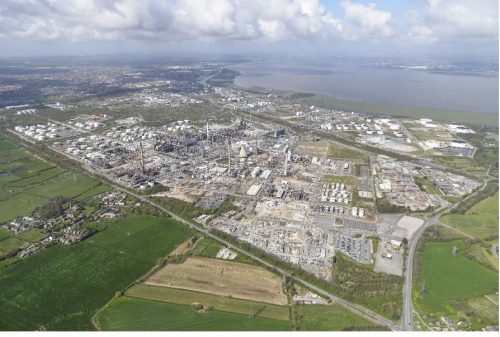Plan could slash greenhouse gases leading to huge investment and thousands of jobs

A new study by the Energy Innovation District (EID) has revealed how a local, smart energy system could reduce greenhouse gas emissions in Ellesmere Port by 34%.
Furthermore, the 10-year plan could leverage billions of pounds in investment and create thousands of jobs, it has been claimed.
The £200,000 EID project – part funded by the Government – also demonstrates potential energy cost savings of up to 25%.
This ‘E-Port Smart Energy Master Plan’ concept was developed during a six-month study from February to July 2019.
The study – which is the first phase of the E-Port Energy project – gathered energy and infrastructure data from local stakeholders to compile a 10-year investment plan.
Cheshire is one of the biggest energy consumers – five per cent of the UK’s total consumption – playing host to the Vauxhall motor plant, numerous chemical companies, and the Stanlow oil refinery owned by Indian conglomerate Essar.
The feasibility study shows how locally-generated energy could be traded between local consumers and generators.
Spearheaded by the Cheshire Energy Hub, the EID brings together energy users, network owners, innovators and partners, including EA Technology, construction group Burns & McDonnell, nuclear business Urenco, Cadent Gas, SP Energy Networks and Peel Environmental, working alongside Cheshire & Warrington LEP, Cheshire West and Chester Council, and the University of Chester.
Ged Barlow, EID chair, said: “We face a huge challenge in the UK to decarbonise and safeguard the industries that make our nation prosper.
“The Energy Innovation District is centred around the industrial heartland of Ellesmere Port, with its concentration of leading businesses in manufacturing and chemical production.
“With companies like Vauxhall threatening job losses in the region, it brings into sharp focus the need to reduce energy costs and offer a viable solution to decarbonisation.
“This study demonstrates how the North West is leading the charge, setting out a nationally-replicable model for smart energy systems.”
Jonathan Chapman, Burns & McDonnell’s UK managing director and principal author of the report, said: “Investment and regulatory change will be required for E-Port Energy to fulfil the huge positive impact it has the potential for, and the same goes for the UK as a whole.
“Our current inability to create supply security that can deal with demand spikes while also finding solutions to meet carbon emission reduction targets reflects some failings in mapping out a clear future.
“However, a whole system approach – a fully-integrated proposal for master-planning and delivering energy services at a district level, encompassing the supply and demand of all interconnected energy vectors – will optimise the UK’s sustainability, reliability and affordability performance in the future.”
Myles Kitcher, from Peel Environmental, said: “Transforming the way we generate and distribute energy could lead to millions of pounds invested in Cheshire.
“The opportunities are huge and the next step is to ensure we have the right skills and workforce to deliver these world-leading technologies.
“This project is one of many in the North West Energy and Hydrogen Cluster which could see over 33,000 jobs created and £4bn invested in the region.”
Other findings outlined in the E-Port Smart Energy Master Plan include:
- A whole system approach combining electricity and hydrogen is key to a lower carbon future – by enabling flexibility between different vectors, the concept unlocks capacity on the energy networks
- The introduction of a higher carbon tax would enable the competitiveness of investment in low-carbon projects and reduce the cost of energy for consumers
- There is a danger that the pace of growth is leaving the job market behind and it is crucial that all parties, from schools through to the industrial players themselves, take ownership of this problem to address the skills issue.
The E-Port Energy project is part of the North West Energy and Hydrogen Cluster – a partnership of companies, regional leaders and network of academic experts under the North West Business Leadership Team – that recently came together to meet the Government’s challenge of delivering the world’s first net-zero carbon industrial cluster by 2040.








